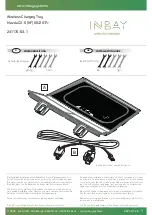
Tire Pressures For High Speed Operation
The manufacturer advocates driving at safe speeds and within posted speed limits.
Where speed limits or conditions are such that the vehicle can be driven at high
speeds, maintaining correct tire inflation pressure is very important. Increased tire
pressure and reduced vehicle loading may be required for high-speed vehicle
operation. Refer to your authorized tire dealer or original equipment vehicle dealer for
recommended safe operating speeds, loading and cold tire inflation pressures.
WARNING!
High speed driving with your vehicle under maximum load is dangerous. The
added strain on your tires could cause them to fail. You could have a serious
collision. Do not drive a vehicle loaded to the maximum capacity at continuous
speeds above 75 mph (120 km/h).
Radial Ply Tires
WARNING!
Combining radial ply tires with other types of tires on your vehicle will cause your
vehicle to handle poorly. The instability could cause a collision. Always use radial
ply tires in sets of four. Never combine them with other types of tires.
Tire Repair
If your tire becomes damaged, it may be repaired if it meets the following criteria:
• The tire has not been driven on when flat.
• The damage is only on the tread section of your tire (sidewall damage is not
repairable).
• The puncture is no greater than a ¼ of an inch (6 mm).
Consult an authorized tire dealer for tire repairs and additional information.
Damaged Run Flat tires, or Run Flat tires that have experienced a loss of pressure
should be replaced immediately with another Run Flat tire of identical size and
service description (Load Index and Speed Symbol).
Tire Types
All Season Tires — If Equipped
All season tires provide traction for all seasons (Spring, Summer, Fall and Winter).
Traction levels may vary between different all season tires. All season tires can be
identified by the M+S, M&S, M/S or MS designation on the tire sidewall. Use all
season tires only in sets of four; failure to do so may adversely affect the safety and
handling of your vehicle.
M A I N T A I N I N G Y O U R V E H I C L E
344
















































